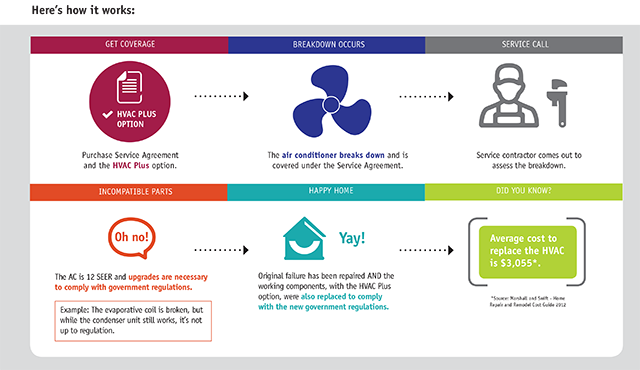HVAC Plus
New government regulations mandating higher energy efficiency standards for heating and air conditioning (HVAC) systems will significantly impact homeowners’ budgets when a HVAC repair or replacement is needed. When you add the HVAC Plus option to the systems and appliances coverage already provided by a Home Warranty Service Agreement, you can delight in knowing that you’re protected from these increasing costs.

What does the HVAC Plus Option cover (for Buyer only)?
2-10 Home Buyers Warranty® (2-10 HBW®) recently added an HVAC Plus option to its Home Warranty Service Agreement that offers buyer coverage for costs related to changing government regulations and code violations. While a homeowner cannot place a service request exclusively for a code upgrade, the option does provide coverage when a certified HVAC technician:
Performs service related to mismatched systems, components having incompatible capacity ratings on covered system or other code violations deemed necessary to affect covered repairs and replacements to heating or air conditioning.
EXCLUDED:
- Upgrades not related to an eligible repair.
DOLLAR LIMITS PER SERVICE AGREEMENT:
- Cost to diagnose, repair and/or replace – $1,000.
Here’s what you need to know.
As of January 1, 2015, the U.S. Department of Energy (DOE) mandated higher energy efficiency standards for heating and air conditioning systems (HVAC Systems).
The DOE has mandated that the minimum SEER (Seasonal Energy Efficiency Ratio) be raised to 14 for most air conditioners in the U.S. and that the minimum SEER rating be raised to 14 for heat pump systems for the entire U.S.

The DOE is also encouraging states to adopt energy codes mandating that when replacing substantial non-working components of an existing HVAC system, the remaining working components must also be replaced. The replacement ensures that components match for improved efficiency. This means a small repair has the potential to become more complex and expensive for homeowners.
Why homeowners need HVAC Plus.
The mandate could result in the need for a complete system replacement. The 2-10 Home Buyers Warranty® (2-10 HBW®) Home Warranty Service Agreement does not cover these mandates, unless the HVAC Plus option is purchased. Under the terms and conditions of the Service Agreement, 2-10 HBW pays for the repair of non-working components of the HVAC, while homeowners are still responsible for the cost to replace the working components of the system to meet the matching requirement.

Why real estate professionals should suggest HVAC Plus to their home buyers.
As a real estate professional, you care about your home buyer’s satisfaction post-closing, and ensuring they don’t incur any unexpected system or appliance breakdowns is key for customer satisfaction. Take the extra step to provide a Home Warranty Service Agreement with the HVAC Plus option to help protect against expensive HVAC repairs due to government regulations.
To purchase HVAC Plus, a $99 option, for protection against this and future government regulations:
Homeowners: 800.743.4210 or to go 2-10.com/HVACPlusNow.
Real estate professionals: 800.795.9595 or log in to Agent Portal.
Frequently Asked Questions
Why is the Department of Energy (DOE) issuing a government mandate on HVAC systems?
The DOE was formed over 35 years ago and focuses on the changing energy needs of the nation. They’re focused on ensuring the nation’s security and prosperity by addressing its energy, environmental and nuclear challenges through science and technology solutions. Their research advancements allow for more efficient HVAC systems to be built that use less energy and save homeowners money. As a result of standards enforced by the DOE, homeowner’s have saved around $55 billion on their utility bills in 2013 alone! Raising the efficiency of newly installed HVAC systems in 2015 will further save homeowners money and protect our energy resources for the future.
What does SEER mean?
Seasonal Energy Efficiency Ratio (SEER) is most commonly used to measure the efficiency of a central air conditioner. The higher the SEER, the more efficient the system. You may have seen SEER and other efficiency ratings on the DOE yellow EnergyGuide labels that have become common on new systems and appliances. Part of the DOE’s Energy Star program also shows the annual energy consumption and operating cost for each appliance for comparison purposes.






